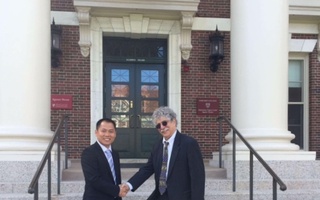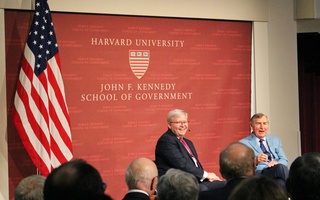The events which have taken place in the People's Republic of China during the last three months have not gone unnoticed among the 178 Chinese nationals currently studying at Harvard, or the thousands of others around the country.
As the pro-democracy movement gathered momentum in Beijing during the month of May, a host of independent Chinese student organizations began to band together at Harvard and other area colleges to register support for the protesters back home.
Students at Harvard and the Massachusetts Institute of Technology (MIT) grouped together this spring to form the May Fourth Foundation, which attempted to raise money to buy word processors and fax machines to send back to students in China. And students from the Boston area founded the China Information Center with the aim of gathering and spreading information about the prodemocracy movement.
During the month of May, student organizations were responsible for a wave of protests and demonstrations around the Boston area. And when the Chinese government began its brutal crackdown on the Tiananmen square protesters, Harvard students and others organized a rally in Washington D.C.
But six weeks after the Tiananmen Square massacre, many Chinese students say that they need to devote themselves to other types of protest. Rather than directly aiding the protesters back home and openly challenging the government, many of them say they now need to challenge the regime of Li Peng and Deng Xiaoping in an indirect way, by forcing the American government to put pressure on China.
But although students here support the prodemocracy movement and condemn the actions of the Chinese government, many say that they are not certain what measures they should take.
"We're sort of thinking and discussing right now," says Zhao Haiching, a post-doctoral student in biochemistry. "How should we move? We haven't decided yet."
"What do we want the U.S. government to do?" he asks. "We're not quite sure about that."
Part of the problem, explains Luo Zhexi, a graduate student in zoology, is that the government crackdown has driven many of the student leaders in China underground. In recent weeks, it has become increasingly difficult to send resources to China.
"Before the crackdown, our major difficulty was in sending information back, sending money back, really trying to keep communication open," says Luo. But in recent weeks, he adds, police have been keeping a close watch on every telephone and fax machine.
And the Chinese government, never known for its receptiveness to criticism, has become increasingly closed in recent weeks, Luo says. "After the massacre, the situation worsened," he says. "The Chinese government pretty much refused to listen to what we wanted to say."
As a result, students say they are trying to move beyond the demonstrations and support movements that they began with.
"Now people are thinking `maybe that's not the only way to support the pro-democracy movement,'" says Yang Zhi. "Now maybe we have to sit down and start thinking about what we can do.
"We recognized that in the democracy movement, the center had to move outside China, and that we should take the initiative," says Luo.
Consequently, many students have turned their attention to the federal government. Many of them criticize the Bush Administration for failing to respond adequately to the crackdown. Although President Bush suspended military aid to China a few days after the massacre, several students feel the U.S. could be doing more to bring pressure to bear on the Chinese government.
Read more in News
The Thesis That Almost Wasn'tRecommended Articles
-
Chinese Students Happy With Executive OrderChinese students at Harvard said they were pleased with President Bush's recent executive order, which will allow them to remain
-
LAST LECTURE ON CHINARev. A. H. Smith of Tientsin, China, will deliver the last of a course of six lectures on "The Present
-
Color Line Cuts Through the HeartJimmy Zhao ’08 says his parents used to joke that if he ever brought a white girl home, at least
-
 Donor Funds Ed School Research on Chinese Academic Stress
Donor Funds Ed School Research on Chinese Academic Stress -
 Former Asst. Defense Secretary Advises Path for U.S.-Chinese Relations
Former Asst. Defense Secretary Advises Path for U.S.-Chinese Relations













